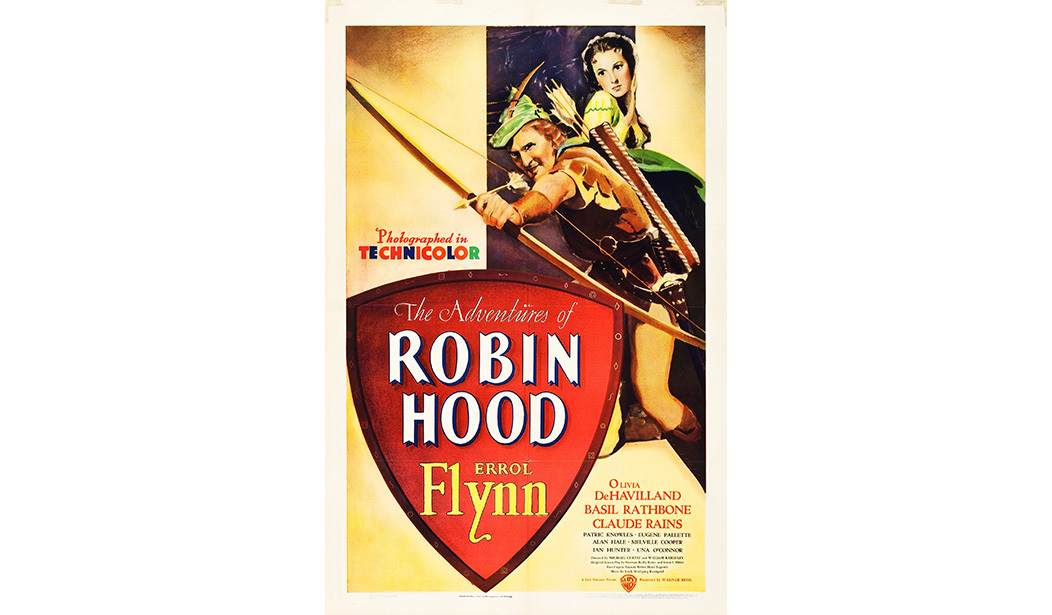Who doesn't love a good swashbuckler? And nobody ever buckled a swash like Errol Flynn, who was, without argument, the best Robin Hood who ever Robin Hooded. Flynn was cast alongside the stunning Olivia de Havilland as Maid Marian and, as the famous Hood, led the Merry Men featuring the wonderful Alan Hale (the father of the Skipper from "Gilligan's Island") as Little John. Together they opposed the nefarious machinations of Prince John (Claude Rains) and Sir Guy of Gisbourne (Basil Rathbone), and in the end saved the lands in the name of King Richard the Lion-Hearted (Ian Hunter).
What a film! What a cast! What a legend!
Speaking of that legend: The legend of Robin Hood goes back possibly as far as the 13th century. But the best-known representation today is that lovable rogue who "steals from the rich and gives to the poor" while leading his band of happy scoundrels on forays from their idyllic Sherwood Forest hideout.
But almost everyone misunderstands the legend and what the story of Robin Hood is really all about. There is no better illustration of this than the Australian Green Party (they would be more aptly called the Red Party, but that's a topic for another day) proposing what they call "Robin Hood policies."
Tax the rich to fund support for the poor - that is how one party will try to win over Australians at the federal election.
Rents, mortgage payments and grocery prices have continued to soar as Australian companies post billion-dollar profits.
The Greens are proposing to kill two birds with one stone by increasing taxes on corporations, and using that money to fund cost-of-living relief.
Greens leader Adam Bandt will present his "Robin Hood reforms" to the National Press Club on Wednesday.
Let's set aside the economic illiteracy of the Greens from Down Under. We can circle back (hah) to that another time. I'd rather write about Robin Hood.
See Related: Ludicrous: Elizabeth Warren Believes It's a Good Idea to Push for Higher Taxes During Election Season
Tax Cuts for the Rich? Clean Energy Credits Mostly Go to Higher-Income Filers
Here's the thing everyone gets wrong about the tale.
Robin Hood was a man out of legend, and rightly so. In his more current presentations, he's seen as the man leading a band of adventurers against the agents of a corrupt government, led by Prince John, Sir Guy of Gisbourne, and the Sheriff of Nottingham (who may or may not have been Sir Guy). But the whole representation of "stealing from the rich and giving to the poor" is misleading. That's not what Hood did - at least, not just that.
Bear in mind the Middle Ages setting in which the Hood legend is set. The only rich people around were the nobility and the royals, who quite literally made their fortunes off the back of the peasantry who were, in essence, serfs. There was no middle class as we know it. Oh, there were some small merchant and craftsman classes that today would fall into the middle class, but that concept as a representative class didn't really exist. The nobles and royals were the government, the government was the nobles and royals, and that was that.
Those nobles and royals taxed the peasantry, along with the few merchants/tradesmen there were. But those taxes fell heavily on the peasantry, who - forgive me for parroting this shibboleth, but at least here it really applies - were least able to afford it. In theory, in return, the King's men were supposed to keep the countryside free of bandits and protect the people against foreign invasion, but a quick look at the palaces and estates of those royals and nobles tells a different tale.
What did Robin Hood do? He didn't just steal from the rich. He stole from the agents of a corrupt governing system. He didn't just give to the poor. He gave the people back their own property, the fruit of their own labor, that was taken from them by force by the agents of an overbearing, corrupt government. That's the truth of the legend of Robin Hood. He wasn't a bandit, he was a revolutionary, one who would have felt right at home in our Continental Congress in 1778. Robin Hood and Thomas Jefferson may well have been good friends.
Today's Robin Hood would have been in favor of cutting (or eliminating) taxes. He would have been in favor of letting people keep the fruits of their own labor. He would have opposed the government taking away the people's property through the threat of force. He would have been against the taxation that is theft.
That's what the Robin Hood legend is really about. It's about being free to work, to live, to do as we please without worrying about an overbearing, autocratic government taking our wealth through excessive taxation.
This seems appropriate.












